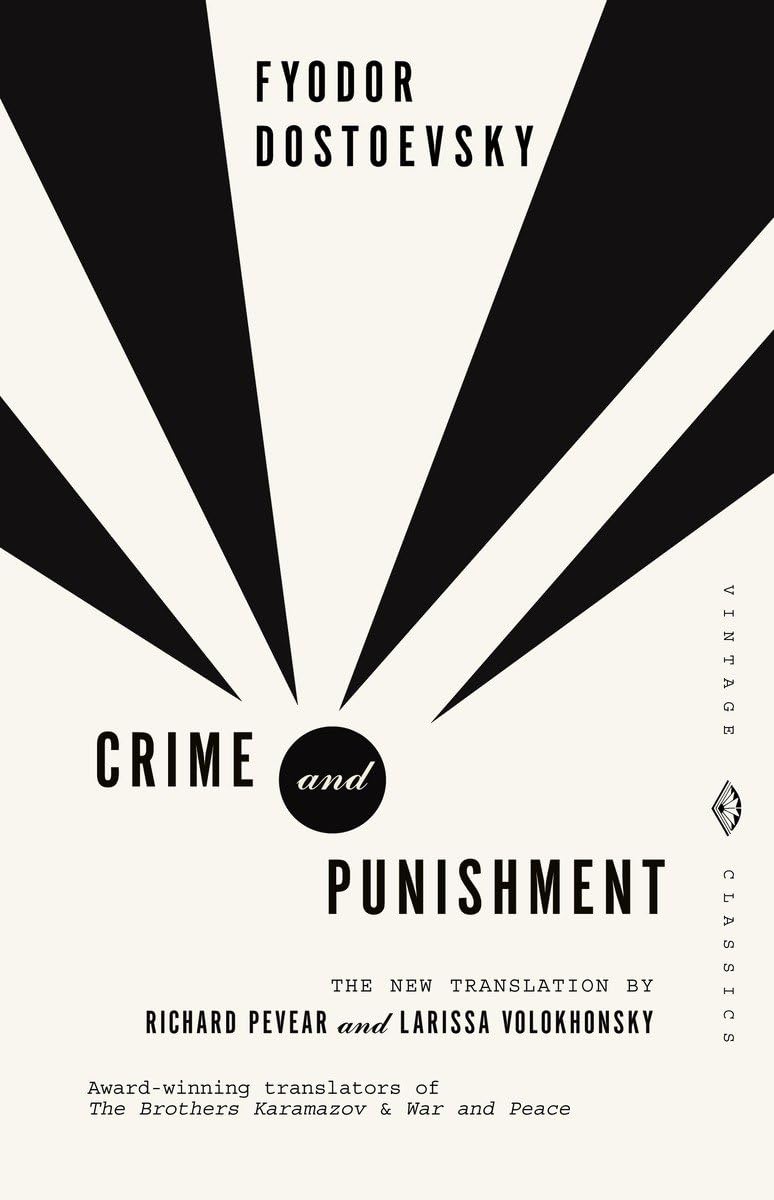Crime and Punishment
Fyodor Dostoevsky
BOOK REVIEW

Step into the hauntingly vivid world of Crime and Punishment, where the bleakness of St. Petersburg becomes a canvas for one of literature's most piercing explorations of morality, guilt, and existential despair. Dostoevsky's masterful narrative thrusts us into the mind of Raskolnikov, a former student plagued by his own convoluted philosophy, spiraling into an abyss of depravity after committing an unspeakable act.
As you delve into this dense yet profoundly engaging tale, it's impossible to ignore the emotional turbulence that Dostoevsky orchestrates with such finesse. With every page you turn, you're not merely reading-you're experiencing Raskolnikov's feverish breakdown, grappling with his theory of the "extraordinary man." This notion, which allows certain individuals to transcend the moral codes governing the masses for the "greater good," drives him to murder a pawnbroker. It's a pensive and terrifying reflection on the human psyche and the lengths to which one will go to justify heinous actions. The amalgamation of passion, melancholy, and guilt is palpable, reverberating within you long after you've closed the book. 🔥
The socio-political landscape of 19th-century Russia looms large throughout the narrative. Dostoevsky intricately weaves the struggles of poverty, inequality, and the philosophical debates of his time into the soul-crushing realities that Raskolnikov and other characters face. This historical context doesn't just serve as a backdrop; it's an integral part of the narrative that compels us to confront uncomfortable truths about human nature and society. As the revolutionaries of Dostoevsky's era clashed over ideals that sought to reinvent society, Raskolnikov embodies the despair of a generation caught between stagnation and rapid change.
Emotions run high, and the arguments regarding the morality of Raskolnikov's actions provoke a seismic reaction in readers. How can we, living in a world rife with moral ambiguity, judge him? Critics have heavily debated the protagonist's psychological complexity and the overarching question of guilt. Some see him as a tragic figure burdened by his own intelligence and ideals, while others perceive him as a coward-someone who shunned responsibility. This ambiguity creates a riveting dialogue between you-the reader-and the text. It's not just a story; it's a confrontation, a demand to reflect on your ethical compass in a world that often blurs the line between right and wrong.
Readers have voiced an array of incandescent opinions, ranging from adulation for Dostoevsky's philosophical depth to frustration with the slow pacing and dense prose. "It's a struggle to get through," some argue, yet many find that those very struggles mirror Raskolnikov's own journey, enhancing the reading experience. Scores of admirers praise the novel's uncanny ability to illuminate the darkest corners of the human experience, while detractors argue the complexities make it inaccessible. Their critiques, though varied, only serve to highlight the novel's profound impact, echoing the universal struggles with justice and morality that resonate even today.
Let's not forget the cultural reverberations of Dostoevsky's work-his profound influence on writers, thinkers, and even filmmakers cannot be overstated. From the existential musings of Albert Camus to the moral dilemmas faced by modern storytellers, the specter of Crime and Punishment looms large, shaping discourses around ethics and authority. Dostoevsky didn't just write a novel; he ignited a revolution in psychological and philosophical literature. ✨️
So, as you take this plunge into the labyrinth of Raskolnikov's mind, prepare to confront your own beliefs, fears, and prejudices. Dostoevsky compels you not merely to observe but to immerse yourself in the chaotic morality of society, to wrestle with the consequences of actions that ripple through time. The journey is not an easy one, but then again, the most powerful truths rarely are. With every twist and turn, Crime and Punishment evokes a plethora of emotions, leaving you utterly transformed, questioning not only the essence of guilt and redemption but also your own humanity. Will you dare to face the darkness?
📖 Crime and Punishment
✍ by Fyodor Dostoevsky
🧾 565 pages
1993
#crimeAndPunishment #dostoevsky #FyodorDostoevsky